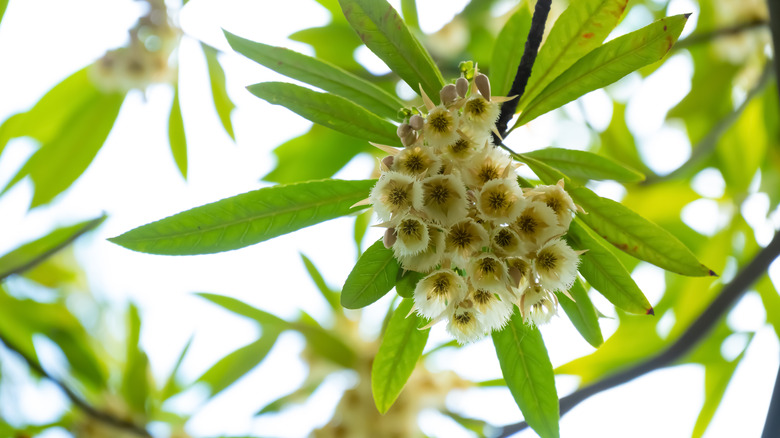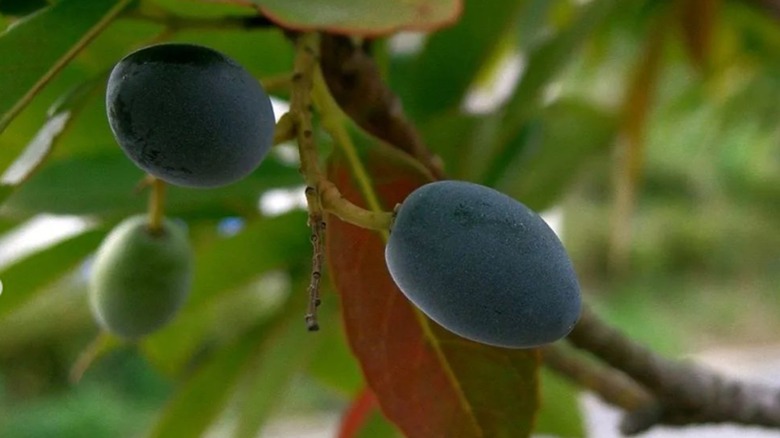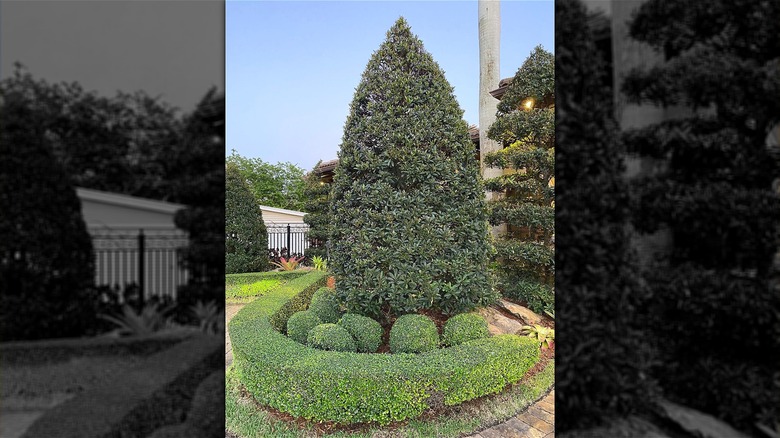Japanese Blueberry Trees Are Relatively Easy To Grow But There Is One Downside
If you're on the hunt for berry-producing bushes perfect for your yard, blueberry plants in general tend to be pretty easygoing, but the Japanese blueberry tree (Elaeocarpus decipiens) is one eye-catching tree that may seem especially attractive to the not-so-green-thumbed. In an exclusive interview with House Digest, our own master gardener, Tiffany Selvey, shared some helpful insights about Japanese blueberry trees. According to Selvey, the Japanese blueberry has some unique advantages, especially for warm climates, but there also are some aspects about the tree that may not make growers so happy, such as its ability to attract wildlife and cause some major messes. "Any tree that produces fruit has the potential to be messy around porches and walkways," warns Selvey.
If you're expecting this plant to be like other blueberries, you may find the Japanese blueberry tree to be full of hidden surprises. In fact, this beautiful tree isn't closely related to blueberries at all! Even with some downsides, is the Japanese blueberry tree still a good choice for your garden? Here's why Selvey says this ornamental fruit tree may still be worth your while and her tips for selecting and planting your Japanese blueberry tree.
Humans can't eat these fruits, but birds will
The first thing to know about Japanese blueberry trees is that their name can be a little misleading. Blueberries belong to the Vaccinium genus in the Ericaceae family, alongside huckleberries, lingonberry, and heather. By contrast, the Japanese blueberry tree belongs to the Elaeocarpaceae family, with a number of other flowering plants and shrubs. The Japanese blueberry tree isn't one of the delicious varieties of blueberries that will thrive in your yard. Instead, this tree grows small, dark olive-like fruits. Sources are conflicted about whether the fruits are technically edible, but most conclude that it doesn't taste very good and may even cause mild stomach upset.
This low-maintenance ornamental tree looks gorgeous, but it may also require some special planning in terms of placement. Although the fruits aren't enjoyable for humans, birds like the fruits while deer will consume the foliage. Therefore, Selvey notes, "You may also want to keep these types of trees away from driveways to avoid getting your car covered in droppings when the birds settle in to feast on ripe fruits."
Is a Japanese blueberry tree is still right for your yard?
If it doesn't produce edible fruit, what benefits does this tree bring? In her exclusive interview with House Digest, Tiffany Selvey expressed, "For those looking for an unique tree, this could be a good option." Because it has dense green foliage and grows up to 35 feet or taller, the Japanese blueberry is best used as a fast-growing tree to plant for privacy in your yard. "There are many factors to consider when selecting any tree, including growing conditions, size, and shape," Selvey says, "The Japanese blueberry tree is only hardy to the warmest zones in the U.S., 8 through 10." If you're gardening in a climate where winters fall below 15 degrees Fahrenheit, this tree might not be the right fit.
Households with pets and small children may also want to practice caution near the Japanese blueberry tree. "Before planting any tree that produces fruit, pet owners should always check to see if they may be toxic," Selvey recommends, "In this case, this tree is not listed by the ASPCA, so I would not plant it anywhere a cat or dog could potentially consume leaves or fruits." This plant will thrive in well-drained soil such as sandy loam, and prefers full sunlight or partial shade, so a bright, sunny, and warm area outside your home could be the perfect place to enjoy this ornamental beauty.


